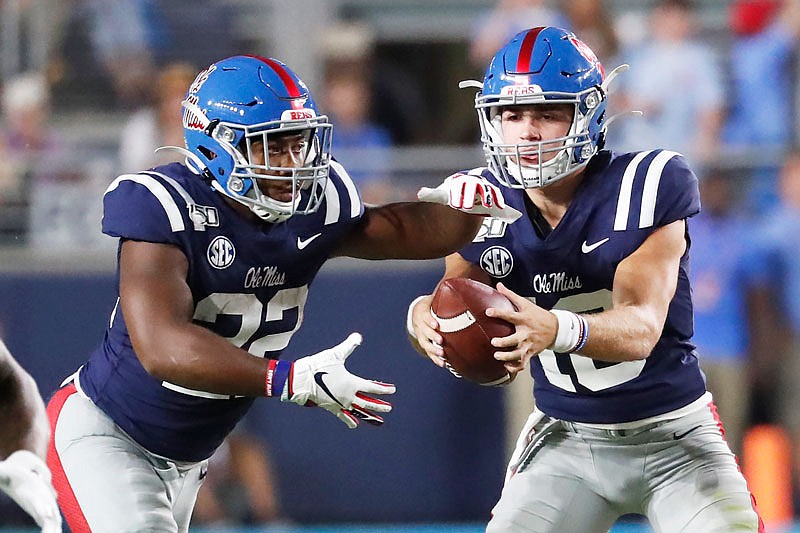COLUMBIA - On the field, the Mississippi Rebels are one of 2019's clearest cases of football heterodoxy.
Missouri (4-1, 1-1 SEC) was already bested by a run-first offense with a mobile quarterback to open the season at Wyoming, and it will be tested again at 6 p.m. today by Mississippi (3-3, 2-1 SEC). The game will be broadcast on ESPN2.
During the last decade or so, NFL teams have become increasingly aware of the benefits of passing on early downs, something college offenses paved the way for. It's an idea and an adaptation that's earned coaches including Lincoln Riley, Andy Reid, Kyle Shanahan and Kellen Moore the label of "offensive innovator", given their offenses a positive jolt and helped power quarterbacks both young and old, from Patrick Mahomes to Matt Ryan, to MVP seasons.
The statistical analyst-centric website FiveThirtyEight, now owned by ESPN, has some good insights that show as NFL offenses have slowly increased the number of passes thrown per game during the past 10 seasons, efficiency, yards per attempt, completion percentage and passing touchdowns as a percent of total touchdowns have also increased, while the interception percentage has fallen.
In the 2017 season, FiveThirtyEight writer Josh Hermsmeyer found that, when faced with a first-and-10 with between seven and nine defenders "in the box" or defending the run, just one NFL team, the Philadelphia Eagles, elected to drop back to pass more often than to run, a 55-45 split. Some of the best offenses that year, including the Patriots, Rams and Saints, all ran less than 60 percent of the time when presented with this situation.
In a collective sample of all first-down play calls from 2009-18, Hermsmeyer found offenses ran 52 percent of the time, even though passing was a more efficient option and resulted in fewer second-and-long situations. In 2018, teams like the Chiefs, Steelers, Falcons and Packers adjusted, called passes more often on first down and benefited from it, while the Seahawks, with Russell Wilson at quarterback, passed on first down just 41 percent of the time, despite pass attempts gaining four more yards than runs on average.
The 2019 Mississippi Rebels, with former center Matt Luke as head coach and former defensive back and Michigan head coach Rich Rodriguez as offensive coordinator, are running on first down 75 percent of the time. Wyoming this season has called a run on 80 percent of first downs, and for both teams, it's a case of scheme being called to fit personnel: a fast, mobile quarterback with an experienced offensive line and athletic ball carriers but few or no playmakers on the perimeter.According to SECStatCat.com, on first down this season Mississippi has run 140 times in 187 plays (74.9 percent), 70 times in 132 plays on second down (53 percent), 34 times in 84 plays on third down (40 percent) and five times on 15 fourth-down tries (33 percent). Missouri, by contrast, runs on first down 57.7 percent of the time, 59 percent on second down, 39.7 percent on third down and has run four times in five tries on fourth down.
The run-heavy calls made even more clear for the Rebels last week in a 31-6 win against Vanderbilt: Mississippi ran on first down 20 times in 23 opportunities, or 87 percent of the time; 12 times in 19 tries on second down (63 percent) and seven times on 13 third downs (53 percent).
John Rhys Plumlee is the runner and likely starter at quarterback tonight as Matt Corral, the passer, recovers from a rib injury. According to SECStatCat, Corrall was 1-for-3 for 6 yards passing on first down, and had eight carries for 83 yards against the Commodores. This year, Plumlee is 7-of-12 on first down for 103 yards, and has 20 carries for 142 yards, while Corral is 24-of-33 for 301 yards on first down.
It's not just limited to the quarterback. Senior running back Scottie Phillips has 59 carries for 298 yards on first down,
If the Tigers learned their lesson in Laramie, they'll know what's coming based on which quarterback is in the game. When Corral is taking snaps, the onus will be placed on Missouri's corners to clamp down on Elijah Moore, who has 36 catches for 460 yards and three scores - the only Rebel receiver with double-digit receptions - and when Plumlee is in, sell out to stop the run.
After the disastrous first game, the Tigers defense has been good all season at getting opponents behind schedule on early downs with tackles for loss or short gains, but the middle of the defense, particularly Cameron Wilkins and whoever else plays at the middle linebacker spot, will be tested. Missouri needs a sure tackler who can wrap up SEC backs and an intelligent player who can read through pre-snap motion and misdirection to replace Cale Garrett in the middle of the defense.
Wyoming ran for 297 yards on 42 carries against Missouri, but 136 of those yards came on two carries because of missed tackles and/or out-of-place defenders. The Tigers will likely leave Homecoming happy if they can tackle well and hold Mississippi to 161 yards on 40 carries.
Related Media: Missouri Tigers Football Podcast [Mississippi preview, Oct. 12, 2019]

